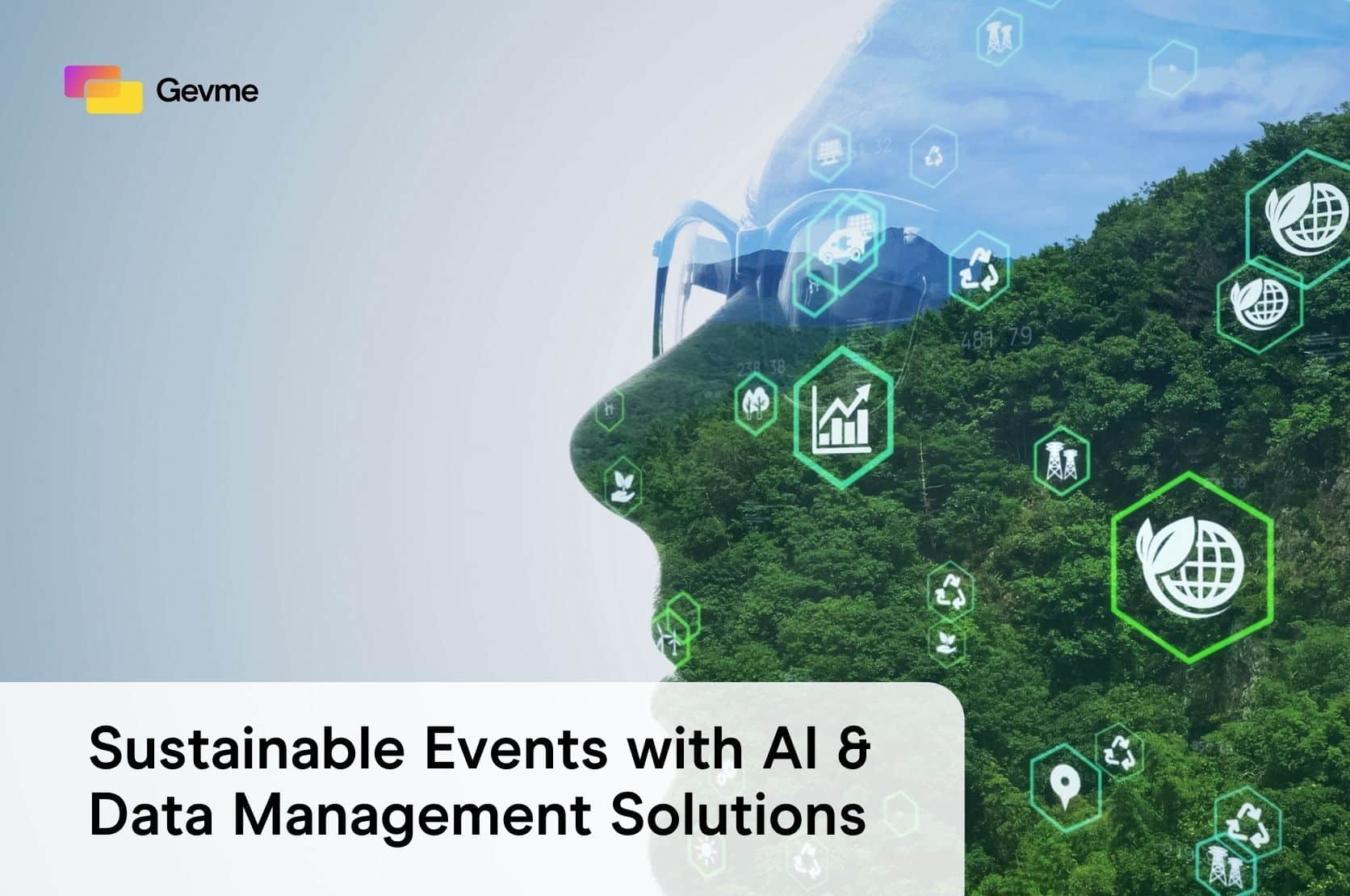In the evolving landscape of event management, sustainability has become more than a buzzword; it’s a fundamental aspect of modern event planning. This shift has been significantly fueled by advancements in artificial intelligence (AI) and data management solutions. These technologies are not just reshaping how we approach event organization; they’re redefining the very essence of eco-friendly event planning. By integrating AI and data-driven strategies, event planners are now equipped to create events that are not only memorable and impactful but also conscientious and environmentally responsible.

The Rise of Sustainable Events
Sustainability in event planning has transitioned from a niche concept to a mainstream requirement, driven by heightened environmental awareness and a global call for responsible practices.
- Growing Environmental Awareness: The increasing awareness of environmental issues among both event organizers and attendees has been a driving force in the adoption of sustainable practices. This heightened consciousness is rooted in a global movement towards eco-friendliness, leading to more demand for events that are not only engaging but also environmentally responsible.
- Shift in Attendee and Organizer Preferences: There’s a noticeable shift in preferences towards sustainability in events. Attendees are now more inclined to participate in events that demonstrate a commitment to reducing environmental impact. Similarly, organizers are recognizing the value of planning events that align with these evolving preferences, not just to meet attendee expectations but also to contribute positively to environmental sustainability.
- Regulatory and Industry Standards: The rise of sustainable events is also influenced by the increasing implementation of regulatory standards and industry guidelines focused on environmental stewardship. Compliance with these standards is becoming a key consideration in event planning, driving the industry towards more sustainable practices.
- Technological Influence: Advancements in technology, particularly in AI and data management solutions, are playing a crucial role in enabling sustainable event planning. These tools provide the means to analyse and optimize various aspects of events for sustainability, from resource allocation to waste management.
- The Business Case for Sustainability: Beyond the ethical and regulatory drivers, there’s a growing recognition of the business benefits of sustainable event planning. This includes potential cost savings, enhanced brand image, and the ability to attract a wider audience, further incentivizing the shift towards eco-friendly practices.

Role of AI in Sustainable Event Planning
Artificial Intelligence (AI) is at the forefront of this sustainable revolution, providing innovative solutions for eco-efficient event planning.
- Resource Optimization: AI’s most significant contribution to sustainable event planning lies in its ability to optimize resource usage. By analyzing historical data and current trends, AI can predict the exact amount of resources needed, such as food and materials, thus minimizing waste. For instance, AI algorithms can forecast attendance numbers with high accuracy, allowing organizers to plan catering and seating arrangements accordingly, reducing both food wastage and the carbon footprint associated with excess production.
- Personalization for Sustainability: AI enables a higher degree of personalization in events, which indirectly contributes to sustainability. By understanding individual attendee preferences and behaviours through data analysis, AI can tailor event experiences, reducing the need for unnecessary resources. For example, personalized itineraries can be created for attendees, ensuring they engage only with relevant sessions and activities, thereby optimizing the overall resource allocation.
- Energy Efficiency and Venue Management: AI plays a crucial role in managing venues more sustainably. Smart AI systems can control lighting, heating, and cooling based on real-time data and occupancy, significantly reducing energy consumption. Additionally, AI-driven tools can assist in selecting venues that align with the sustainability goals of an event, considering factors like energy efficiency and waste management practices of the venue.
- Waste Reduction and Recycling: AI technologies can enhance waste management strategies by analyzing waste patterns from past events and suggesting optimal ways to reduce, reuse, and recycle. This might involve strategic placement of recycling stations or recommendations on how to minimize single-use materials.
- Transport and Logistics Optimization: AI can optimize travel and logistics, a significant aspect of event sustainability. It can plan efficient transportation routes, suggest eco-friendly travel options to attendees, and even help in coordinating shared transportation, all of which contribute to reduced carbon emissions.

Data Management Solutions for Eco-Friendly Planning
Data management is a critical pillar in the shift towards sustainable event planning. Leveraging this technology enables a more systematic approach to eco-friendly practices.
- Comprehensive Environmental Impact Analysis: Data management systems can gather and analyze extensive data related to an event’s environmental impact. This includes detailed tracking of carbon emissions, energy consumption levels, waste generation, and water usage. By having a granular understanding of these elements, event planners can pinpoint specific areas where sustainability efforts can be maximized.
- Predictive Analytics for Resource Optimization: Modern data management tools employ predictive analytics to forecast resource needs more accurately. This capability allows planners to optimize resource allocation – for example, accurately predicting the amount of catering required to minimize food waste, or adjusting energy usage based on anticipated attendee patterns.
- Sustainability Reporting and Compliance: These solutions facilitate detailed sustainability reporting, helping organizations comply with environmental regulations and standards. Data-driven reports can demonstrate an event’s adherence to sustainability guidelines, an essential aspect for events seeking certifications or fulfilling corporate social responsibility objectives.
- Enhancing Attendee Insights for Sustainable Choices: Data management tools can also analyze attendee behaviour and preferences, offering insights into more sustainable choices. For instance, understanding attendee transportation choices can lead to promoting greener travel options or organizing shared transportation.
- Long-term Sustainability Strategy Development: Finally, the accumulation and analysis of data across multiple events enable organizations to develop long-term sustainability strategies. Trends and patterns identified through data can guide future event planning, fostering a culture of continuous improvement in sustainability efforts.
Integrating Sustainability in Event Marketing
The integration of sustainability in event marketing, powered by AI and data management, represents a strategic and innovative approach to promoting eco-friendly practices:
- AI-Driven Sustainable Marketing Strategies: AI can analyze market trends and attendee data to develop targeted, sustainable marketing strategies. For instance, it can identify the most effective channels and messages for promoting an event’s green initiatives, ensuring that the marketing efforts resonate with the eco-conscious audience.
- Data-Driven Insights for Green Campaigns: Data management tools play a pivotal role in shaping eco-friendly marketing campaigns. By analyzing attendee preferences and behaviours, these tools can help in crafting personalized messages that emphasize the event’s sustainability features, such as zero-waste initiatives or carbon offset programs.
- Promoting Sustainability Initiatives: Leveraging technology in event marketing allows planners to effectively communicate their sustainability initiatives. This includes showcasing eco-friendly aspects of the event through various digital platforms, creating engaging content that highlights green practices, and using social media to spread awareness about the event’s environmental commitment.
- Enhancing Attendee Engagement with Sustainability: Engaging attendees with interactive and informative content about the event’s sustainability efforts fosters a deeper connection. Techniques like virtual tours of sustainable venues, interactive infographics detailing eco-friendly measures, and social media campaigns focusing on sustainability themes can significantly enhance attendee engagement and awareness.

Challenges and Solutions in Implementing AI and Data Management
Implementing AI and data management solutions in sustainable event planning can be challenging, yet there are several strategies to address these complexities:
- Technical Complexity and User Adoption: The integration of AI can often be technically challenging and intimidating for users. To address this, event planners can collaborate with specialized AI consultants or companies that offer user-friendly AI solutions tailored for event management. Regular training sessions for staff can also ease the adoption process.
- Data Privacy and Security: Handling sensitive attendee data requires strict adherence to privacy laws and regulations. Implementing robust data encryption, conducting regular security audits, and ensuring compliance with international data protection standards (like GDPR) are essential. Clear communication with attendees about how their data is being used and secured can help in building trust.
- Balancing Cost with ROI: The initial investment in AI and data management tools can be significant. Planners should conduct a thorough cost-benefit analysis, considering not only the immediate costs but also the long-term benefits in terms of enhanced efficiency, improved attendee experience, and strengthened sustainability outcomes. Exploring scalable solutions that allow for incremental implementation can also be cost-effective.

- Keeping Pace with Technological Advancements: The rapid evolution of AI and data analytics tools means that event planners need to stay abreast of the latest developments. Attending industry conferences, participating in professional networks, and continuous learning through webinars and workshops can help planners stay updated and make informed decisions about integrating new technologies.
- Integrating with Existing Systems: Ensuring that new AI and data management tools integrate seamlessly with existing event management systems can be a hurdle. Opting for platforms that offer API integration and customizable modules can facilitate smoother integration and avoid disruptions in existing workflows.
Future Trends: AI, Data, and Event Sustainability
Looking ahead, the intersection of AI, data management, and sustainable event planning is poised for significant evolution:
- Enhanced Predictive Analysis: Future AI developments will likely incorporate complex algorithms that can predict attendee behaviours with unprecedented accuracy. These systems could analyze historical data, current trends, and real-time interactions to tailor event elements, such as session recommendations and resource allocation, thereby enhancing both attendee satisfaction and sustainability.
- Deeper Big Data Insights: We can expect advanced big data tools that not only track and analyze standard sustainability metrics but also provide insights into less obvious areas such as attendee travel patterns, digital resource usage, and indirect environmental impacts. This could lead to more nuanced and holistic approaches to sustainable event planning.
- Comprehensive Integration: Future integration of AI and data management solutions will likely encompass a broader range of event aspects, ensuring sustainability is a key consideration at every planning stage. This might include AI-driven supply chain optimization for sustainable sourcing and data-driven strategies for minimizing the overall ecological footprint of events.
- Real-time Sustainability Monitoring: Upcoming technologies could offer live monitoring of key sustainability metrics, enabling event planners to make instantaneous adjustments. This real-time data could cover aspects such as energy and water usage, waste generation, and attendee engagement in sustainability initiatives, providing a dynamic approach to managing environmental impact.
- Collaboration Enhancement through AI: Future AI tools might facilitate stronger collaboration among event stakeholders by providing shared platforms for tracking and managing sustainability goals. This collaborative approach, driven by AI analysis, could lead to more cohesive and effective sustainability strategies.
- Advancements in Eco-friendly Technologies: Anticipate innovative technologies specifically geared towards sustainable events, such as advanced waste management systems, carbon-neutral transportation options for attendees, and eco-friendly digital infrastructure. These technologies would reduce the environmental impact of events and set new standards in sustainable event planning.
Gevme and Sustainable Event Planning
In the context of sustainable event planning, Gevme’s platform integrates AI and data management solutions, making it a critical tool for eco-friendly event organization:
- AI-Driven Digital Solutions for Sustainability: Gevme incorporates AI to enhance the sustainability of events. By utilizing AI algorithms, Gevme can predict attendee preferences and behaviours, enabling event planners to make data-driven decisions that reduce waste and optimize resource allocation. For example, AI can help predict the right amount of digital materials needed, thereby avoiding overproduction.
- Data Management Solutions for Eco-Friendly Planning: Gevme’s platform excels in data management, offering tools that help track sustainability metrics. This data-driven approach allows event organizers to measure their environmental impact accurately, identify areas for improvement, and adjust their strategies to be more eco-conscious.
- Reducing Paper Waste with Smart Digital Solutions: Gevme addresses the challenge of paper waste by offering digital alternatives powered by intelligent systems. Digital handouts, brochures, and QR codes are made more efficient through AI, ensuring that digital resources are utilized optimally, reducing the environmental footprint.
- Personalized Sustainable Experiences: Leveraging AI, Gevme’s sustainable swag bag experience offers personalized digital content to attendees. AI algorithms analyze attendee data to provide tailored recommendations, ensuring a memorable experience while minimizing the environmental impact of physical giveaways.
- AI-Enhanced Digital Signage: Gevme’s digital signage solutions, supported by AI, contribute to reducing traditional signage waste. AI optimizes the content displayed on digital screens, ensuring relevant and timely information is presented, thus enhancing attendee engagement and sustainability.
- Comprehensive Eco-Friendly Event Strategies: Gevme champions sustainable event practices not just as a trend, but as a necessity. By integrating AI and data management into its platform, Gevme helps planners create events that are not only efficient and engaging but also significantly more sustainable.

Conclusion
The integration of AI and data management solutions in event planning marks a significant milestone in our journey towards more sustainable practices. These technologies offer unprecedented opportunities to reduce the environmental impact of events, enhance attendee engagement, and streamline the planning process. With platforms like Gevme leading the way, the event industry is poised to make a substantial shift towards eco-friendliness. By adopting these innovative tools, event planners can not only create memorable and impactful events but also contribute to a more sustainable and responsible future.








